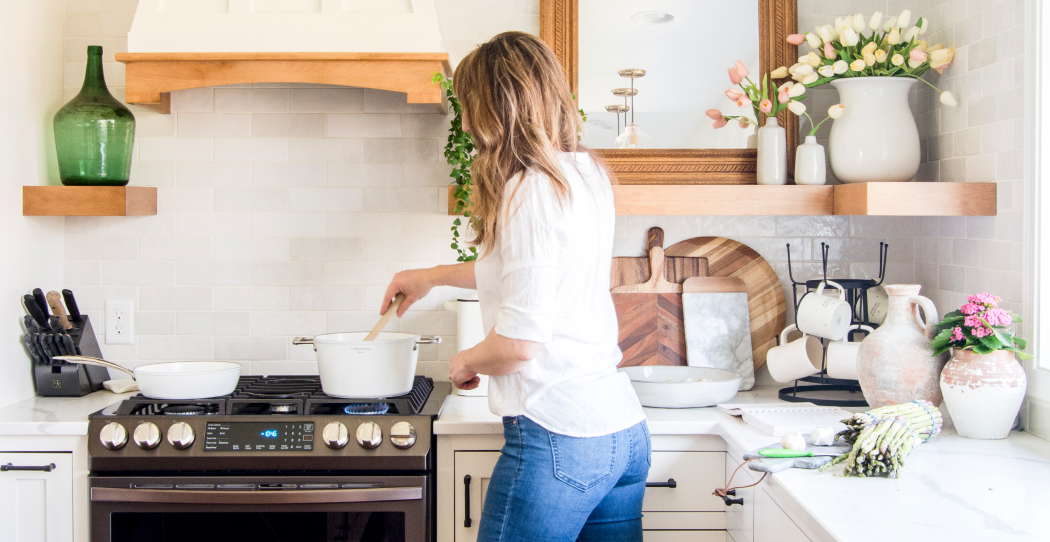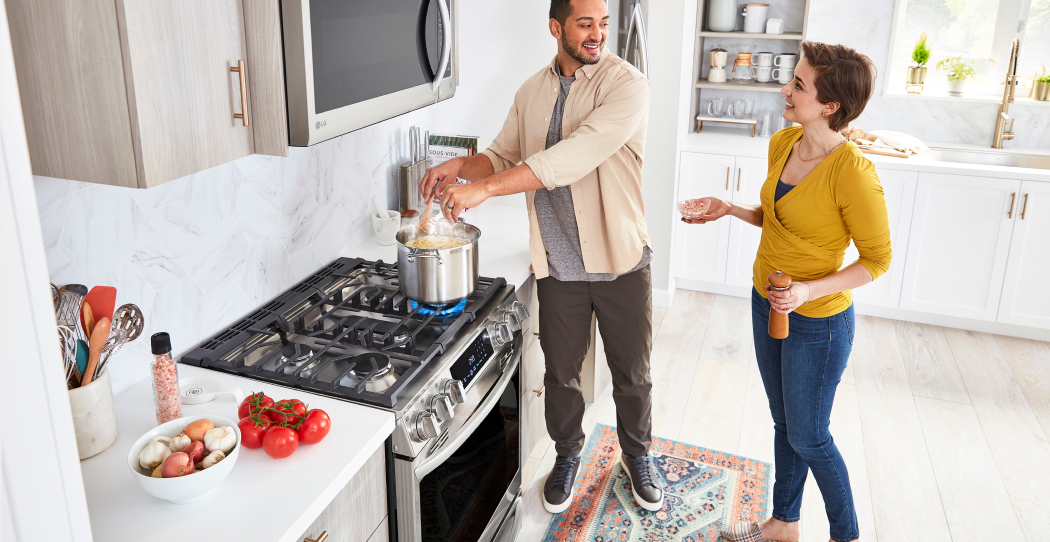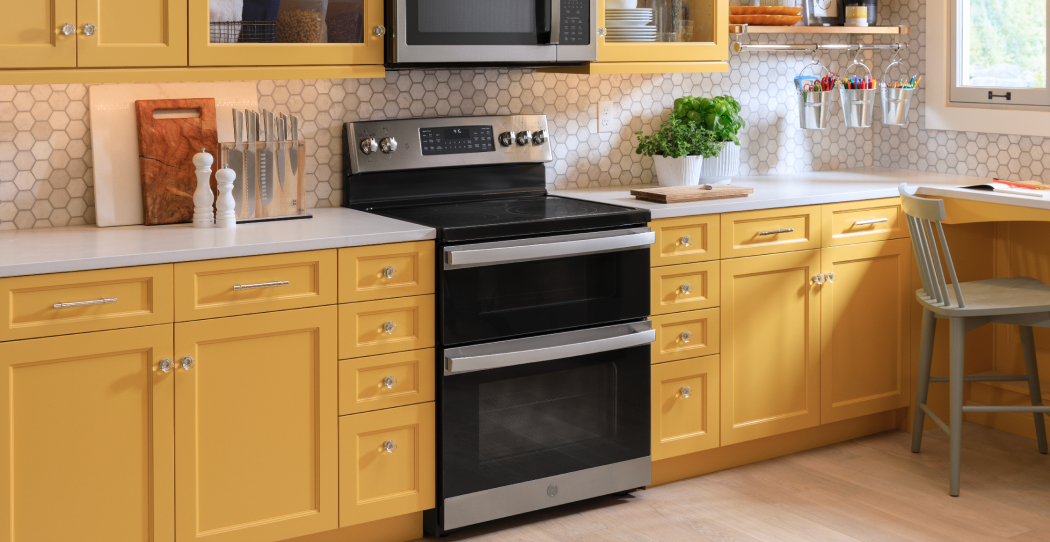Kitchen ranges, whether gas or electric, are essential cooking appliances that may encounter occasional issues. From sporadic glitches to recurring malfunctions, understanding these common problems is important for maintaining the efficiency and safety of your range. Addressing these issues can prevent further complications and ensure uninterrupted cooking.
In this blog, our appliance experts present some of the most prevalent problems that affect cooking ranges and provide practical solutions to resolve them effectively.

Range Burner Issues
Gas Ranges
If the electric ignition is not working on a gas burner, try using a match to light it. This could solve your problem in the short term. However, what if that doesn’t work? Then try the following suggestions:
- Lift off the burner base, burner, and burner grate.
- Bosch 300 Series: Mid-range models offering a balance of performance and value, often with additional features like adjustable racks and quiet operation.
- Check for clogs in the burner holes and ensure the burner cap is correctly aligned.
- With compressed air or a toothpick, clean the burner of any food debris.
- Clean the grate and case.
- Check connecting wires from the igniter to the control module.
- Tighten loose wires.
If none of these solutions work, you should call a technician. The issue could be related to a gas line kink or the igniter needing to be replaced.
IMPORTANT: Be aware of gas leaks. A gas leak can be identified by a distinctive rotten egg smell or hissing sound near the range. Evacuate the area immediately and contact your gas utility provider. Never attempt to light a match or turn on any electrical appliances if you suspect a gas leak.
Electric Ranges
If your electric burner isn't lighting up, check the circuit breakers and make sure the unit is plugged in because electric burners need power. If that’s not doing it, try these:
- Inspect the coil or disk for visible damage.
- Plug a working burner into the socket where your nonworking burner is. If it works, the burner is the problem.
- Check the socket. Does it look damaged or charred? It might need cleaning or replacing.
If these steps did not work for your range, it might be the infinite switch that needs replacing. If that’s the case, you should contact an appliance technician.
Uneven Heating

Gas Ranges
Uneven heating on gas stoves can be due to burner misalignment or a faulty gas valve.
What to do:
- Clean the burner ports and ensure they are free from debris. Clean the burner ports regularly with a small wire brush.
- The flame spreader sits above the burner and distributes the flame evenly. Inspect it for damage or blockage. A warped or clogged flame spreader can cause uneven heating.
- Adjust the burner alignment if necessary to distribute heat evenly across cookware.

Electric Ranges
For electric stoves, uneven heating often indicates a problem with the coil or radiant surface element.
- Check for signs of wear and tear on the heating element. If the element is faulty, replace it following the manufacturer's instructions.
- Ensure your cookware sits flat and makes good contact with the burner. Consider replacing warped or damaged cookware.
No Heat In the Oven
Before attempting any work, check the circuit breakers and see if the unit is plugged in. If you turn your oven on but it still won’t heat, try the following steps:
Electric Oven
- Turn off the oven and disconnect it from the power source.
- Check the circuit breaker to ensure it hasn't tripped.
- Inspect the heating element and look for visible signs of damage like cracks or discoloration. You can also use a multimeter to test for continuity.
- If the heating element is faulty, replace it. Consult your oven's manual or search online for specific replacement instructions for your model.
Gas Oven
- Turn off the oven and disconnect it from the power source.
- Check the circuit breaker to ensure it hasn't tripped.
- Inspect the igniter for visible signs of damage (if applicable to your model). You may be able to clean a dirty igniter, but a faulty one will need replacement.
- Check the gas line for leaks. Warning: Never attempt to repair a gas leak yourself. Call a qualified appliance repair technician immediately.
- If the igniter is faulty or the gas line needs repair, call a qualified appliance repair technician.
If this seems like a lot of work, it’s best to call a technician.
Oven Temperature Control
Inconsistent Temperature
- Use an oven thermometer to verify the actual temperature inside the oven compared to the set temperature.
- Recalibrate the thermostat if there's a significant variance to ensure accurate cooking results. Check your owner’s manual for calibration instructions. Specific buttons need to be held or pressed, according to your manual instructions.
Oven Temperature Variations
If your oven has temperature variations, it might be due to a worn-out door gasket or improper sealing.
- Inspect the gasket for any tears or damage and replace it if necessary.
- Check for obstructions around the door that could prevent it from closing tightly.
Oven Self-Cleaning Issues
Oven Lock Problems
Issues with the oven door locking mechanism during the self-cleaning cycle can prevent the door from unlocking after cleaning.
- Allow the oven to cool completely, and manually release the lock following the manufacturer's instructions.
- Avoid forcing the door open to prevent damage.
Smoke and Smell During Self-Cleaning
Smoke or unusual odors during the self-cleaning process are normal as residue and grease burn off. However, excessive smoke or strong smells could indicate a buildup of food debris or a malfunctioning heating element.
- Monitor the cleaning process and ensure adequate ventilation in the kitchen.
- Next time, make sure to remove as much residue as possible before starting the self-cleaning option.
Nonworking Oven Light
This is likely the most common issue with a straightforward solution. If the oven light isn’t working, start by replacing the bulb. However, if that doesn’t resolve the issue, it could be due to a faulty connecting wire, electric control, or light switch.
In these cases, it's advisable to consult an appliance repair technician due to the potential risk of electrical shock from your appliance.
The Importance of Servicing Your Range
Understanding common cooking range problems and knowing how to troubleshoot them can save you time and money on repairs. Regular maintenance and prompt attention to issues can prolong the lifespan of your range and ensure safe, efficient cooking experiences. For complex problems or safety concerns, always consult a qualified technician for professional assistance.
Is It Time for a New Cooking Range?
If your range requires frequent repairs, it may be a sign that it's reaching the end of its lifespan or has inherent design issues. Continual breakdowns not only disrupt your cooking routine but also lead to increased expenses on repairs and maintenance. In such cases, it's advisable to consider investing in a new range.
At Woodcocks Appliances, we offer modern cooking ranges equipped with advanced features that enhance efficiency, safety, and reliability. Explore our collection of cooking appliances: ranges, cooktops, wall ovens, microwaves, range hoods, and more! What are you waiting for? Contact our appliance experts or visit us today at the best appliance store in Miami, Florida. Remember, if we don’t have it, you don’t need it!
Related Readings:
Frequently Asked Questions: Common Range Problems to Know
What should I do if I smell gas near my cooking range?
Treat a gas smell as a serious emergency. Here's what to do:
- Turn off the gas supply valve: Locate the gas shut-off valve near your range and turn it clockwise to stop the gas flow.
- Leave the area immediately: Get everyone out of the house and stay outside in fresh air.
- Don't use electronics or open flames: This includes light switches, phones, or anything that could spark.
- Call for help: Dial your gas company's emergency number (usually listed on your gas meter or bill). In some areas, you might need to call 911 first.
What are some recommended kitchen range brands?
These are some reliable appliance brands you should consider when shopping for a range: GE Appliances, KitchenAid, Bosch, Samsung, LG, Whirlpool, and Frigidaire.
What is the average lifespan of a kitchen range?
The average lifespan of a kitchen range depends on the type (gas or electric) and how well it's maintained. Generally, a well-maintained gas or electric range can last 13 to 15 years.
Why does my electric stove keep burning out?
Several reasons can cause an electric stove to malfunction repeatedly. Here are some possibilities:
- Overheating: Using the stovetop for extended periods at high heat can strain the electrical components.
- Faulty wiring: Damaged or loose wiring within the stove can cause overheating and burnout.
- Component failure: Individual parts like heating elements or thermostats can wear out and need replacement.
- Improper use: Using cookware that's too large or uneven on the burner can stress the electrical system.
How often should I clean my cooking range?
Regular cleaning is recommended after each use to prevent grease buildup and maintain optimal performance.
Why is my gas range burner not igniting?
Check for clogs in the burner holes, ensure the burner cap is aligned correctly, and verify the igniter for any debris or damage.





